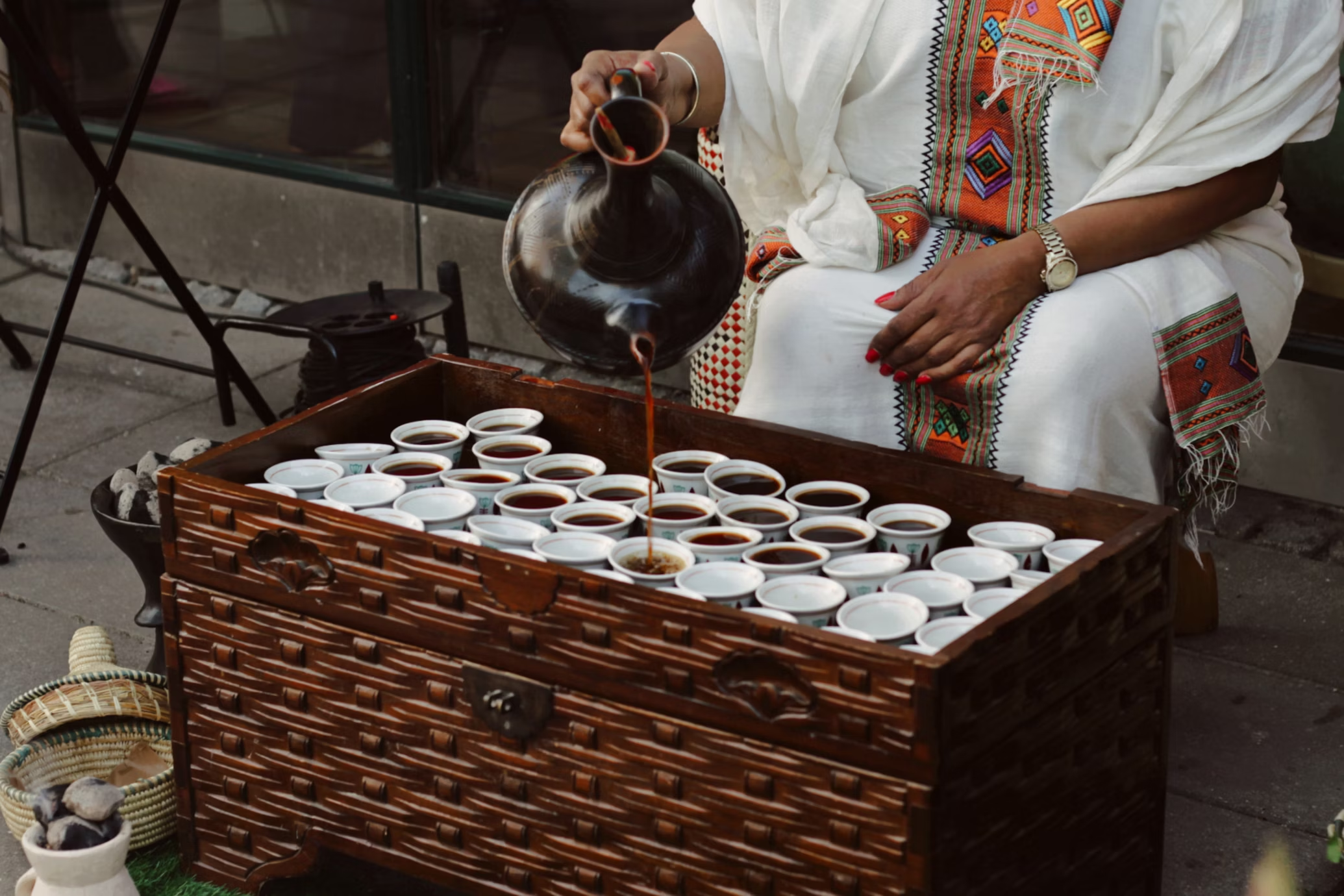
Ethiopia, known as the birthplace of coffee, has a rich tradition of honoring this beloved beverage through a ceremonial practice that dates back centuries. The Ethiopian coffee ceremony is far more than just preparing a drink—it’s a cultural ritual that symbolizes hospitality, friendship, and respect. This practice invites participants to slow down, savor the moment, and engage in meaningful conversation. Let’s take a closer look at this ancient ceremony and the important role it plays in Ethiopian culture.
The Significance of Coffee in Ethiopian Culture
In Ethiopia, coffee is more than a beverage—it is an essential part of daily life and a way to bring people together. According to legend, coffee was first discovered in Ethiopia by a goat herder named Kaldi, who noticed that his goats became unusually energetic after eating the red cherries from a certain tree. Since then, coffee has been deeply embedded in Ethiopian culture.
The coffee ceremony is a daily occurrence in many Ethiopian households, whether to welcome guests, celebrate special occasions, or simply enjoy the company of family and friends. The ceremony is not rushed—it’s about taking the time to connect with others while savoring the flavor of freshly brewed coffee.
The Coffee Ceremony Process
The Ethiopian coffee ceremony is a meticulous and spiritual experience, with each step performed with care and attention. Here’s how it unfolds:
- The Roasting of Coffee Beans
The ceremony begins with the hostess roasting green coffee beans in a pan over an open flame. As the beans roast, they produce a rich aroma that fills the room, symbolizing the start of the ceremony. Guests are invited to inhale the fragrance, a gesture that marks the beginning of the communal experience. - Grinding the Coffee
Once the beans are roasted to perfection, they are ground using a traditional mortar and pestle. This step is done manually, further enhancing the connection between the participants and the coffee. The sound of the grinding creates a rhythm that sets the tone for the rest of the ceremony. - Brewing the Coffee
The ground coffee is then added to a special clay pot called a jebena, where it is brewed with water over a charcoal stove. The jebena has a long neck and a round base, designed to hold the coffee grounds as the water slowly extracts their flavors. This process can take several minutes, allowing time for conversation and reflection. - Pouring the Coffee
When the coffee is ready, it is poured into small cups from a height, creating a frothy layer on top. This pouring technique is done with precision, and it is considered an art in itself. The coffee is usually served without milk but can be sweetened with sugar, and it is often accompanied by snacks like popcorn, bread, or kollo (roasted barley). - Three Rounds of Coffee
In traditional Ethiopian ceremonies, the coffee is served in three rounds, each with its own name and significance: Abol (the first round), Tona (the second), and Baraka (the third). The first round is the strongest, while the subsequent rounds are lighter. The final round, Baraka, means “blessing,” and it is believed to bring goodwill and harmony to those who partake.
The Social and Spiritual Importance
The coffee ceremony is a time for conversation, bonding, and reflection. It is a communal experience that encourages interaction and connection, often serving as a forum for discussing important matters, sharing stories, and fostering relationships. It is also a moment to give thanks, appreciate life’s blessings, and show respect to guests.
In rural areas, the ceremony often takes place outside, with participants seated on grass or mats. The hostess typically wears traditional clothing, further highlighting the importance of the occasion. In urban areas, the ceremony may take place indoors but still retains its cultural and social significance.
The Role of Women in the Ceremony
The coffee ceremony is traditionally conducted by women, often the matriarch of the family or a hostess, and is passed down through generations. Women take pride in their ability to roast, grind, and brew the perfect cup of coffee, and their role as facilitators of the ceremony reflects their importance in maintaining the cultural continuity of this cherished tradition.
Coffee as a Symbol of Unity
Ethiopia’s coffee ceremony is not only a cultural tradition but also a symbol of unity. It transcends social and economic differences, as people from all walks of life gather to share in the experience. Whether it’s a simple gathering at home or a special celebration, the coffee ceremony represents a time to connect, heal, and find common ground.
Conclusion
The Ethiopian coffee ceremony is a beautiful reflection of the country’s deep connection to coffee and its role in fostering community, friendship, and tradition. By taking part in this ancient ritual, participants are reminded of the value of patience, togetherness, and mindfulness. In a fast-paced world, Ethiopia’s coffee ceremony offers a chance to slow down and savor the richness of life—one cup at a time.




